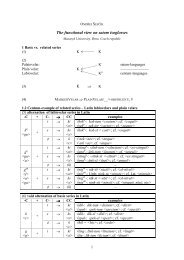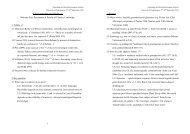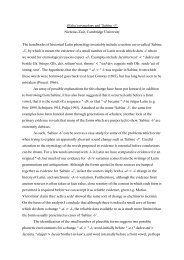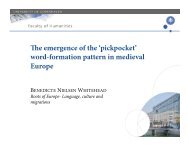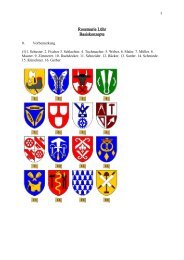Roots Deep in Heaven Indo-Iranian ritual concepts in a cross ...
Roots Deep in Heaven Indo-Iranian ritual concepts in a cross ...
Roots Deep in Heaven Indo-Iranian ritual concepts in a cross ...
Create successful ePaper yourself
Turn your PDF publications into a flip-book with our unique Google optimized e-Paper software.
Velizar Sadovski, <strong>Indo</strong>-<strong>Iranian</strong> <strong>ritual</strong> <strong>concepts</strong> <strong>in</strong> a <strong>cross</strong>-cultural perspective, 18.09.2012 3<br />
amítrā yé ʹtra naḥ sánti<br />
tā́n agna ā ́ diyā tuvám ||2||<br />
á<strong>in</strong>ān diyatām <strong>in</strong>drāgnī ́<br />
sómo rā́jā ca medínau |<br />
índro marútvān ādā́ nam<br />
amítrebhyaḥ kr̥ ṇotu naḥ ||3||<br />
our enemies that are here —<br />
them, O Agni, do thou tie up.<br />
3. Let Indra-and-Agni tie them up,<br />
and k<strong>in</strong>g Soma, allied;<br />
let Indra with the Maruts<br />
make ty<strong>in</strong>g-up for our enemies (WL 1,356).<br />
● Cf. AVŚ. 6,103, used <strong>in</strong> the <strong>ritual</strong>, together with 104, accord<strong>in</strong>g to Kauś.-Sū. (16,6) “<strong>in</strong> a battle rite for victory over<br />
enemies: fetters, as the comm. expla<strong>in</strong>s, are thrown down <strong>in</strong> places where the hostile army will pass” (WL 1,356):<br />
saṃdā́ naṃ vo br̥ ́haspátiḥ<br />
saṃdā́ naṃ savitā ́ karat |<br />
saṃdā́ naṃ mitró aryamā ́<br />
saṃdā́ naṃ bhágo aśvínā ||1||<br />
sám paramā́nt sám avamā́n<br />
átho sáṃ dyāmi madhyamā́n |<br />
índras tā́n páry ahār dā́ mnā<br />
tā́n agne sáṃ diyā tuvám ||2||<br />
amī ́ yé yúdham āyánti<br />
ketū́n kr̥ tvā́ anīkaśáḥ |<br />
índras tā́n páry ahār dā́ mnā<br />
tā́n agne sáṃ diyā tuvám ||3||<br />
1. Ty<strong>in</strong>g-together may Brihaspati,<br />
ty<strong>in</strong>g-together may Savitar make for you;<br />
ty<strong>in</strong>g-together may Mitra, Aryaman,<br />
ty<strong>in</strong>g-together may Bhaga, the Açv<strong>in</strong>s [make].<br />
2. I tie together the highest, together the lowest,<br />
also together the middle ones;<br />
Indra hath encompassed them with a tie;<br />
do thou, Agni, tie them together.<br />
3. They yonder who come to fight,<br />
hav<strong>in</strong>g made their ensigns, <strong>in</strong> troops —<br />
Indra hath encompassed them with a tie;<br />
do thou, Agni, tie them together.<br />
6.1. B<strong>in</strong>d<strong>in</strong>g spells as ‘verdicts to Non-Liberty / Non-Be<strong>in</strong>g’: stylistically elaborated, e.g. repetitions with<br />
form variation, gradations, enumerations accord<strong>in</strong>g to various classificatory patterns:<br />
● AVŚ. 16,8,2e: sá nírr̥ tyāḥ pā́śān mā ́ moci<br />
AVŚ. 16,8,3e: só ʹbhūtyāḥ pā́śān mā ́ moci<br />
AVŚ. 16,8,4e: sá nírbhūtyāḥ pā́śān mā ́ moci<br />
(AVŚ. 16,8,5e) sá párābhūtyāḥ pā́śān mā ́ moci<br />
(AVŚ. 16,8,11e) só ʹṅgirasāṃ pā́śān mā ́ moci<br />
(AVŚ. 16,8,12e) sá āṅgirasā́nāṃ pā́śān mā ́ moci<br />
(AVŚ. 16,8,13e) só ʹtharvaṇām pā́śān mā ́ moci<br />
(AVŚ. 16,8,14e) sá ātharvaṇā́nāṃ pā́śān mā ́ moci<br />
[etc., for 27 stanzas; verses a–d rema<strong>in</strong> identical!]<br />
He shall not be liberated from the bonds of Nirr̥ ti.<br />
He shall not be liberated from the bonds of Abhūti.<br />
He shall not be liberated from the bonds of Nirbhūti.<br />
He shall not be liberated from the bonds of Parābhūti.<br />
He shall not be liberated from the bonds of the Aṅgiras-as.<br />
He shall not be liberated from the bonds of the Āṅgirasa-s.<br />
He shall not be liberated from the bonds of the Atharvan-s.<br />
He shall not be liberated from the bonds of the Ātharvaṇa-s.<br />
[cf. also above, § 7.1.]<br />
6.2. ‘B<strong>in</strong>d<strong>in</strong>g down’ and ‘beat<strong>in</strong>g down’ demons and (abstract) demoniac powers: *drug h am BAND H - /<br />
*drug h am (ni +) G H AN-. – Yt. 4,4:<br />
θβąmca drujəmca baṇdāmi<br />
θβąmca drujəmca niγne<br />
θβąmca drujəmca nižbarəm<br />
aδairi.naēməmca<br />
I will b<strong>in</strong>d thee and the Drug,<br />
beat down thee and the Drug,<br />
br<strong>in</strong>g away thee and the Drug,<br />
to the low-side.<br />
● Ad drujəmca niγne cf. RV druhó hantā́ , jav jaṇta … drujō etc.; SCHLERATH, AvWb II, 160a, EWA 1,761<br />
● ‘Un-b<strong>in</strong>d<strong>in</strong>g’ mantra aga<strong>in</strong>st Druh – formula druho muñcāmi varuṇasya pāśāt. AVP. 17,23,3 (druho mā<br />
muñcantu varuṇasya pāśāt); AVP. 2,3,1.4–5 (emend./transl. ZEHNDER 26–28):<br />
+ kṣetriyāt tvā nirṛtyā + jāmiśaṃsād<br />
druho muñcāmi varuṇasya pāśāt |<br />
anāgasaṃ brahmaṇā tvā kṛṇomi<br />
śive te dyāvāpṛthivī abhūtām ||1||<br />
sūryam ṛtaṃ tamaso grāhyā yathā<br />
devā muñcanto asṛjan nir enasaḥ |<br />
evā tvā kṣetriyān nirṛtyā + jāmiśaṃsād<br />
druho muñcāmi varuṇasya pāśāt ||4||<br />
amoci yakṣmād duritād + avadyād<br />
druhaḥ pāśād grāhyāś cod amoci |<br />
jahad avartim avidat syonām<br />
apy abhūd bhadre sukṛtasya loke ||5||<br />
1. Vom Kṣetriya-Leiden, vom Verderben, vom Geschwisterfluch,<br />
von Arglist befreie ich dich, von der Schl<strong>in</strong>ge Varuṇas;<br />
schuldfrei mache ich dich mit e<strong>in</strong>em Zauberspruch: „Himmel<br />
und Erde s<strong>in</strong>d dir günstig geworden“.<br />
4. Wie die Götter die vom Anpacken der Dunkelheit getroffene<br />
Sonne befreiend herausliessen aus dem Übel, so befreie<br />
ich dich vom Kṣetriya-Leiden, vom Verderben, vom<br />
Geschwisterfluch, von Arglist, von der Schl<strong>in</strong>ge Varuṇas.<br />
5. Er ist jetzt befreit worden von der Auszehrung, von der<br />
Verfehlung, von der Schande; von der Schl<strong>in</strong>ge der Arglist<br />
und (von) der Grāhi ist er befreit worden; den Mangel zurücklassend<br />
hat er e<strong>in</strong>e angenehme (Lage) gefunden: er ist<br />
dazu gekommen <strong>in</strong> der glücklichen Welt der Wohltat.<br />
6.3. Gods as ‘b<strong>in</strong>ders’ of enemies: Soma/Haoma, Mitra/Miθra, Indra/Vərəθraγna:<br />
6.3.1. Numerious Avestan and Vedic testimonies of ‘hand(-and-foot)-b<strong>in</strong>d<strong>in</strong>g’ of enemies:<br />
● AVP 1,18,4a.d<br />
ihed asātha na puro gamātha- [...]<br />
viśve vo devā upa + saṃdyān iha ||1||<br />
● Avesta (Miθra, Vərəθraγna):<br />
Yt. 10,48: āa ya miθrō frauuazaite<br />
auui haēnaii + xruuišiieitiš<br />
auui hąm.yaṇta rasmaoiiō<br />
(For priority among one’s relatives:)<br />
Here you have to be, you will not go forwards<br />
all gods will b<strong>in</strong>d you here together.<br />
When Mithra comes driv<strong>in</strong>g<br />
aga<strong>in</strong>st the blood-thirsty enemy armies,<br />
towards those who (<strong>in</strong> the area ly<strong>in</strong>g)



